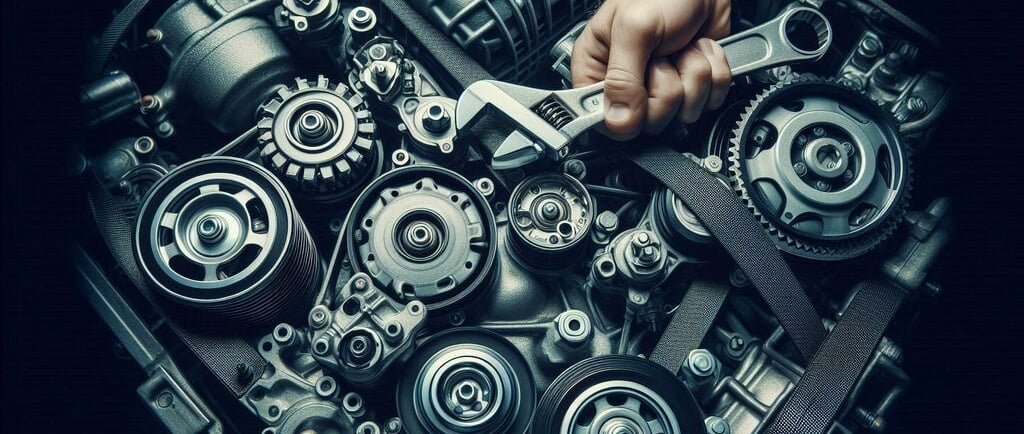Alternators
When we think about car maintenance, we often focus on the engine or brakes, but one critical component that’s frequently overlooked is the alternator.
ELECTRICAL SYSTEMS
11/14/20244 min read


Alternators: Powering Your Car's Electrical System and Keeping You on the Road
When we think about car maintenance, we often focus on the engine or brakes, but one critical component that’s frequently overlooked is the alternator. This small but powerful part keeps your car's electrical systems running and your battery charged. Understanding how your alternator works and recognizing when it needs maintenance can make a big difference in your vehicle’s performance. In this article, we'll cover the basics of alternators, how they function, common signs of wear, and practical maintenance tips.
What is an Alternator?
An alternator is a type of generator that converts mechanical energy from the engine into electrical energy. This electricity powers all the electrical systems in your car, from the lights and dashboard to the stereo and charging ports. The alternator also recharges the battery, ensuring your car starts reliably every time you turn the key.
Key Functions of the Alternator
Powering Electrical Systems: The alternator provides a steady stream of electricity to your car's systems so they function smoothly.
Charging the Battery: While the battery supplies power when the engine is off, the alternator recharges it while driving to keep it fully charged.
Maintaining a Stable Voltage: Alternators help keep voltage levels steady, protecting electrical components from power surges and drops.
How Does an Alternator Work?
An alternator is powered by the engine through a belt, usually called the serpentine belt. As the engine runs, it turns the belt, which rotates a pulley connected to the alternator. Inside, the alternator's rotor spins within a magnetic field, generating alternating current (AC) electricity. This AC power is then converted to direct current (DC) by a device called the rectifier, making it usable for the car's electrical systems and battery.
Main Components of an Alternator
Rotor and Stator: The rotor creates a magnetic field as it spins, while the stator converts this field into electrical energy.
Rectifier: Converts AC to DC power, which is compatible with the car's systems.
Voltage Regulator: Ensures the alternator produces the correct voltage to protect the car's electronics.
Signs of a Failing Alternator
Just like any part of a car, alternators have a lifespan. They generally last 80,000-150,000 miles, depending on driving conditions and maintenance. Here are some key signs that your alternator might be in trouble:
1. Dimming or Flickering Lights
If your headlights, dashboard lights, or interior lights start dimming or flickering, it could indicate that your alternator isn't providing a steady stream of power. This is often one of the earliest signs of a failing alternator.
2. Dead Battery
A failing alternator may not be able to recharge your battery fully, causing it to die more quickly than usual. If you find yourself with a dead battery frequently, even after replacing it, the alternator may be the culprit.
3. Unusual Noises
If you hear a grinding or whining noise under the hood, it might be a sign of a worn-out alternator bearing or a problem with the serpentine belt. This sound is often due to parts inside the alternator wearing down over time.
4. Dashboard Warning Light
Many cars have a dashboard warning light that appears as a battery symbol. If this light comes on while you're driving, it's often a sign of an alternator problem. Don’t ignore it—it’s a cue to get your alternator checked soon.
Maintaining Your Alternator: Tips for Longevity
Proper maintenance can extend the life of your alternator and help avoid unexpected repairs. Here are some practical maintenance tips:
1. Inspect the Serpentine Belt Regularly
The serpentine belt powers the alternator. Over time, it can become worn, cracked, or loose, affecting the alternator's performance. Checking the belt for signs of wear every 20,000-30,000 miles, or as recommended by your vehicle's maintenance schedule, can help you catch problems early.
2. Keep Electrical Load Balanced
Adding too many aftermarket electrical accessories, like subwoofers or extra lights, can strain the alternator. If you’ve added new electronics, consider upgrading your alternator or ensuring they don’t overload the system.
3. Clean and Tighten Battery Connections
Since the alternator charges the battery, any loose or corroded battery connections can affect its performance. Make sure your battery terminals are clean and tightly connected to allow the alternator to function effectively.
4. Monitor Your Battery’s Health
A weak battery forces the alternator to work harder to keep it charged. By testing your battery regularly and replacing it as needed, you can reduce the stress on your alternator and improve its longevity.
FAQs about Alternators
Here are some common questions people have about alternators, along with straightforward answers to help you better understand this essential part.
How Long Does an Alternator Last?
The lifespan of an alternator depends on your driving habits, environment, and maintenance. On average, an alternator can last between 80,000 and 150,000 miles.
Can You Drive with a Bad Alternator?
It’s possible to drive short distances with a failing alternator, but it’s risky. The battery will eventually die, leaving you stranded. If you suspect an alternator issue, have it checked promptly.
How Much Does an Alternator Replacement Cost?
An alternator replacement can cost anywhere from $300 to $700, depending on your vehicle’s make and model. While it’s a significant expense, regular maintenance can help avoid unexpected replacements.
Conclusion: Keep Your Alternator in Good Shape for a Reliable Ride
Your alternator may not be the most noticeable part of your car, but it's one of the most essential for keeping your vehicle's electrical system running smoothly. By paying attention to early signs of wear, keeping the serpentine belt in check, and maintaining the battery, you can extend the life of your alternator and keep your car in top shape.
If you're noticing any of the warning signs mentioned, don’t wait—schedule an inspection with a trusted mechanic. Regular maintenance and timely repairs are the keys to avoiding breakdowns and keeping your car running safely.


